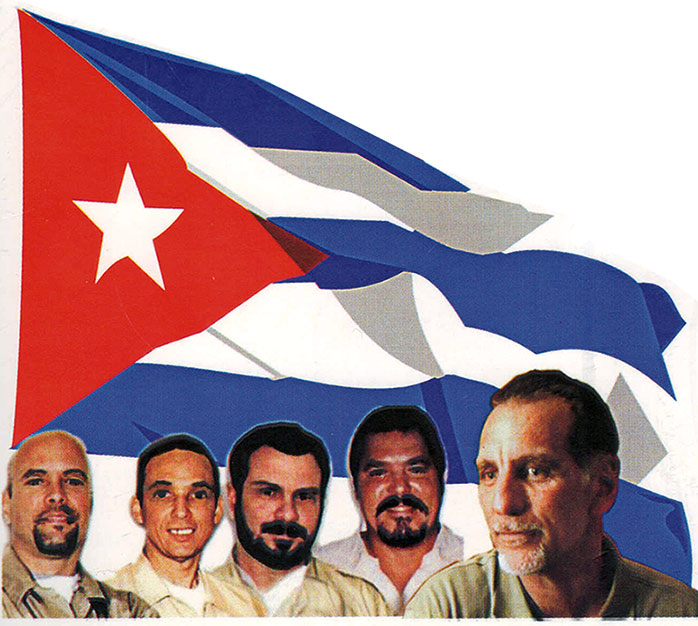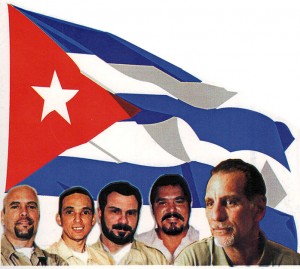

Gerardo Hernández Nordelo, Antonio Guerrero Rodríguez, Fernando González Llort, Ramón Labañino Salazar, and Rene González Sehewert.


Gerardo Hernández Nordelo, Antonio Guerrero Rodríguez, Fernando González Llort, Ramón Labañino Salazar, and Rene González Sehewert.
People of conscience gathered Sept. 12 in cities across the country and the world to commemorate the 16th year since Gerardo Hernández, Ramón Labañino, Antonio Guerrero, Fernando González and René González — known collectively as the Cuban Five — were arrested in Miami.
Several years before their arrest in 1998, these five intelligence officers began a mission to infiltrate and monitor anti-Cuban terrorist organizations in the Miami area. They passed on their findings, including plots against Cuba, to the Cuban authorities, who in turn informed the FBI. But instead of prosecuting the right-wing groups, the FBI arrested the five.
For 17 months following their arrest, the five were held in isolation, as 26 charges were brought against them, including conspiracy to commit espionage and conspiracy to commit murder. The latter charge was only brought against Hernández nine months after his arrest, in an atmosphere of intense media pressure for his alleged involvement in the 1996 shooting down of a “Brothers to the Rescue” plane over Cuba.
Between 2000 and 2001, the Five were tried in Miami, despite attempts to have the venue changed to a less biased and hostile environment. It was subsequently discovered that the U.S. government was secretly paying journalists in Miami while they covered the trial, which helped to create an atmosphere of pressure that contributed to the Five’s conviction and harsh sentencing.
The Five’s attorneys and the international movement for their freedom scored an important legal and political victory in 2005, when a three-judge panel of the 11th Circuit Court of Appeals overturned the convictions and ordered a new trial, citing the prejudicial atmosphere of the trial as well as the U.S. government’s misconduct. This victory did not last, however. In response to the prosecution’s appeal, the full court agreed to re-hear the case, and exactly one year after the Cuban Five’s convictions were overturned, they were reinstated. In 2009, the Supreme Court refused to review the case, exhausting nearly all judicial avenues for their release.
Solidarity can free the Five
Currently, two of the Five are free in Cuba; three are still imprisoned in the U.S. René González endured 13 years in prison, completing his sentence in 2011, and was allowed to return to Cuba in 2013. Fernando González was imprisoned 15 years and returned to Cuba in February. Guerrero, Labañino and Hernández remain unjustly incarcerated. Guerrero’s sentence was reduced in 2009 from life to 21 years, 10 months; if he completes his sentence, he will be released in 2017. Labañino’s sentence was also reduced, from life to 30 years, with a release date in 2024. Gerardo Hernández’s sentence was not reduced, and his situation is the most dire, as he is serving two life terms plus 15 years.
The only possible legal solution at this point are habeas corpus appeals, based mostly on the new evidence of U.S. government misconduct in paying Miami journalists before, during and after the trial. Although the U.S. Supreme Court has refused to hear the case, appeals of a future habeas decision could wind their way to the Supreme Court, but, given the makeup of federal courts in the U.S., a dismissal is not likely, and there is no time frame for such a decision.
What has been said from the beginning of this case — and continues to be emphasized by the Cuban people, the Five, their families and their supporters all over the globe — is that this is a political case determined by political factors. The Cuban Five are political prisoners, and as has been shown by historical movements to free political prisoners, the solution will only be motivated by political calculations.
One of these calculations could have to do with Alan Gross, the U.S. Agency for International Development subcontractor arrested in 2009 in Havana. He was there to illegally distribute telecommunications equipment as part of one of the U.S. government’s so-called “Cuba democracy” programs aimed at subverting the revolution. He is currently serving a 15-year sentence, and there has been talk on both the U.S. and Cuban sides of the possibility of an exchange of Gross for the remaining members of the Five. But just as the Five’s supporters are not holding their breath for a victory in the courts, neither can we wait for a deal from the U.S. government, which has continually rejected gestures of goodwill from Cuba.
That is why the Cubans attach so much importance to solidarity, especially coming from the people of the U.S. It is this solidarity, in demanding freedom for Guerrero, Labañino and Hernández, that, if strong enough, might achieve justice. Free all the Cuban Five!
Want to know more about the case of the Cuban Five? Watch this 3-minute video: youtu.be/peyjFpoNDfM
Malcolm Sacks is an organizer of the Venceremos Brigade, and met with Fernando González in Cuba several times in July.
In the 1950s, when Japan and much of Europe was in ruins, the U.S. accounted…
This “Call from the General Federation of Trade Unions in Gaza to Labor Unions in…
Desde que la administración de Donald Trump/Elon Musk tomó las riendas del poder a finales…
Philadelphia Palestine activists marched from Philadelphia City Hall to Day & Zimmermann on April 18…
Marching up Blue Hill Avenue through the Black and immigrant Dorchester neighborhood, Trans Day of…
This statement was recently issued by over 30 groups. On Friday, March 28, Dr. Helyeh…